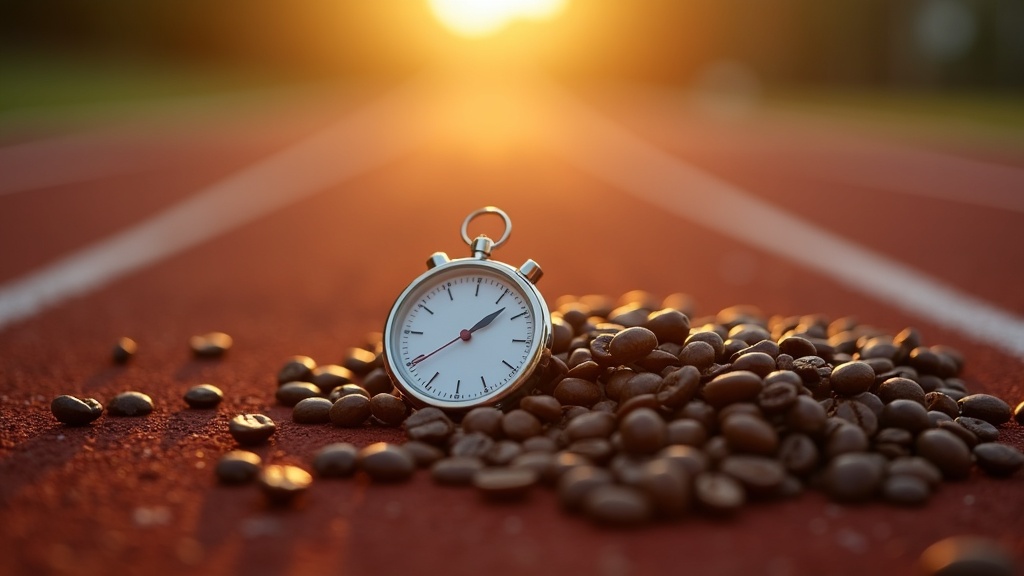 Caffeine and running are a combo that gets plenty of attention in the fitness world. A lot of runners swear by a cup of coffee before heading out the door, while others are wary of potential side effects. If you’re curious about how caffeine could affect your next run or just want a better grasp of whether it actually helps, I’m going to get into the good, the bad, and everything in between. Whether you’re aiming for a personal best or just enjoy weekend jogs, understanding caffeine’s impact might come in pretty handy.
Caffeine and running are a combo that gets plenty of attention in the fitness world. A lot of runners swear by a cup of coffee before heading out the door, while others are wary of potential side effects. If you’re curious about how caffeine could affect your next run or just want a better grasp of whether it actually helps, I’m going to get into the good, the bad, and everything in between. Whether you’re aiming for a personal best or just enjoy weekend jogs, understanding caffeine’s impact might come in pretty handy.
The Science Behind Caffeine and Running Performance
Caffeine is the world’s most popular stimulant, found in coffee, tea, energy drinks, and even some running gels. What makes caffeine interesting for runners is how it interacts with the body’s central nervous system. After you have caffeine, it blocks the action of a brain chemical called adenosine, a compound that makes you feel tired. As a result, you feel more alert and less likely to notice fatigue.
On a physiological level, caffeine promotes the release of adrenaline, which gets your heart rate up and increases blood flow to muscles. This extra boost might help you run faster or longer, depending on the intensity of your run and your overall fitness level.
Numerous studies, like those published by the National Institutes of Health, suggest that caffeine can improve endurance performance. Some research shows improvements in time-trial runs and reduced feelings of effort, especially for events lasting from 5k to marathon distance. I find these effects become even more apparent during moderately hard or long runs, when fatigue really starts to kick in.
Caffeine’s influence on the body isn’t limited to just feeling caffeinated. Research suggests that caffeine affects fat metabolism and may even impact muscle contractions, giving an all-in-one benefit for endurance athletes. Some studies indicate that athletes who regularly consume moderate caffeine may adapt slightly, so periodic breaks can help restore its maximum effect.
How Caffeine May Boost Running Performance
Caffeine helps running performance in a handful of useful ways. Here are the main benefits I’ve noticed, plus what scientific research backs up:
- Delays Fatigue: You feel less tired, especially as your run goes on, allowing you to push a little further than usual.
- Increases Alertness and Focus: Caffeine sharpens concentration. This helps you stay mindful of pace and form, especially during races or interval training.
- Perceived Effort Feels Lower: You might notice your run feels easier, even if you’re putting in the same, or more, work. This can give a nice mental edge, especially during tough workouts.
- Might Boost Fat Burning: There’s some evidence that caffeine helps your body use fat for energy, especially during longer efforts, which can help conserve those important carb stores for later in the run.
In my own experience, a little caffeine before a long run means I’m less likely to hit the dreaded wall. I’ve also found that a pre-race coffee gives me a mood and energy lift that just feels good when nerves are running high.
Potential Drawbacks and Things to Watch Out For
While caffeine has some clear perks, it’s not always smooth sailing. Not everyone responds to caffeine the same way, and side effects are pretty common if you overdo it. Here are a few things that runners sometimes notice:
- Jitters and Nervousness: Having too much caffeine can leave you feeling shaky, anxious, or even a bit scattered.
- GI Distress: Upset stomach or the sudden urge to find the nearest bathroom can happen, especially if you have a sensitive gut or take caffeine close to run time.
- Sleep Disruption: Late-day caffeine can mess with sleep, which ends up hurting performance the next day.
- Increased Heart Rate: Higher heart rates are normal with caffeine, but if you’re sensitive, this can be uncomfortable or distracting.
When I tried running after a big energy drink, it was definitely tougher to settle into a groove; I felt way too twitchy for my liking. If you’re new to caffeine or upping your dose for a race, it’s worth trying things on a regular training day first.
Should Runners Avoid Caffeine?
Whether caffeine makes sense for your running routine really depends on your body and preferences. Caffeine isn’t something runners need to avoid entirely, but it does make sense to approach it with some awareness.
For most healthy adults, moderate caffeine (about 3–6 mg per kilogram of body weight, or roughly 200–400 mg for most people) is considered safe. If you already enjoy coffee or tea most days, there’s typically no reason to suddenly cut it out before a run; just be mindful of timing and how your body reacts. People with arrhythmias, anxiety disorders, or GI sensitivities may want to use less or skip it altogether on run days.
I’ve found that spacing caffeine 30 to 60 minutes before a run works well, especially if I’ve had a light snack with it. If you’re prone to jitters, tiredness after caffeine, or stomach problems, it may be worth trying a caffeine-free run to see how you feel by comparison.
Caffeine Dosage and Safety for Runners
Sticking to the right dose helps you get the upsides of caffeine without the crash. Standard guidance suggests most runners benefit from 3–6 mg of caffeine per kilogram of body weight (a 150 lb person would aim for 200–400 mg). Higher amounts don’t always equal bigger benefits. Sometimes, the opposite happens.
Pay attention to how you feel after caffeine. If you get headaches, heart palpitations, or digestive discomfort, lower your dose or try spacing it out more. Most energy gels list caffeine content, which makes things easier to track during a race. Remember to listen to your body and adjust as needed, since everyone has a slightly different tolerance level.
It’s also worth noting that if you regularly consume large amounts of caffeine, your body may get used to its effects, so the boost might not feel as strong. To keep sensitivity up, you could consider cycling your caffeine intake, especially in the weeks leading up to a major race.
Common Concerns About Caffeine and Running
Wondering what to expect, or if caffeine works for everyone? Here’s some straight talk based on research and personal experience.
Does caffeine give a boost to running performance?
Caffeine can moderately boost running performance, especially for endurance and time-trial events. Multiple studies show improvements in distance, speed, and perceived effort, meaning you might run further or faster with the same amount of effort.
Does caffeine make it hard to run?
While caffeine generally helps, too much can make running harder by causing jitters, anxiety, or stomach issues. Some people find high doses uncomfortable. If you stick to moderate amounts and experiment with timing, most folks won’t find running harder with caffeine.
Should runners avoid caffeine?
Most runners don’t need to avoid caffeine, but it’s smart to watch your body’s reaction. If caffeine makes you feel unwell or affects your sleep, consider cutting back or using it only occasionally. For specific health conditions like high blood pressure or anxiety, a chat with your doctor can help clear things up.
BONUS : If you are looking for even faster results the proper way, then you can use something that I personally use to get them in the quantities that our body needs them. Wondering what am I talking about? Then make sure to check this one out!

Αφήστε μια απάντηση